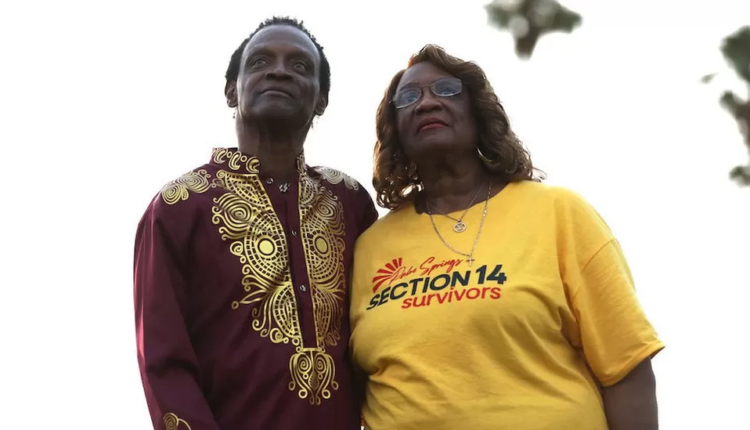Alvin Taylor and his sister, Pearl, were kids when the City of Palm Springs, California began burning down their neighbours’ homes. But they still remember the smell of the smoke.
“We would come home, and a neighbour’s house would be gone – just burned rubble,” Pearl Taylor Devers said.
In 1965, the City of Palm Springs began razing the Taylor’s predominately black neighbourhood to make way for commercial development near the city centre. Their father, a carpenter, had built their modest home from the foundation up. Their mother, a house cleaner, worked for celebrities like Lucille Ball and Amelia Earnhardt and took the children to church every Sunday.
The Taylors grew up in an area of Palm Springs known as Section 14; racial segregation made the neighbourhood one of the few places where black people could purchase a home.
But that was before the fires. Every week a new home would go up in flames – sometimes with a neighbours’ belongings inside. The Taylor family moved from home to home in Section 14, trying to outrun the flames. Each time their house was destroyed.
After a lengthy investigation, a 1968 report from the California Department of Justice deemed the destruction of Section 14 a “city-engineered holocaust.”
Nearly six decades later, survivors of Section 14 could finally see restitution after the California Department of Justice Reparations Task Force issued a sweeping set of reparations proposals last week.
The thousand-page report sets out 115 legislative recommendations to address inequalities among black Californians and ensure that injustices – like the destruction of Section 14 – never happen again.
Among the recommendations is a controversial proposal for cash payments of at least $1.2m (£943,400) to each black descendant of slaves.
Members of the task force said they hope their report helps the public understand the true cost of racism in California, regardless of whether the government ends up deciding to give direct cash payments or not.
The issue is highly divisive in the state. A new poll from the Public Policy Institute of California found that 54% of likely California voters had an unfavourable view of the task force, while nearly the same amount, 59%, believe the state should offer a formal apology for human rights violations and crimes against humanity on African slaves and their descendants.
The atmosphere was charged on Thursday, when the report was presented to the public, with some saying payments could not come soon enough.
“It’s my money, and I want it now,” one woman yelled.
Others others said it was unfair to ask this generation to pay for the sins of the past through reparations that will ultimately be funded by tax dollars.
California Republican Assemblymember Bill Essayli, who is Lebanese-American, said he opposes the recommendations of the task force because
“This whole thing of focusing on people’s race and victimhood, [and] is nothing but an attempt to divide Americans and pit them against each other,” he told the BBC.
Source: BBC


Comments are closed.